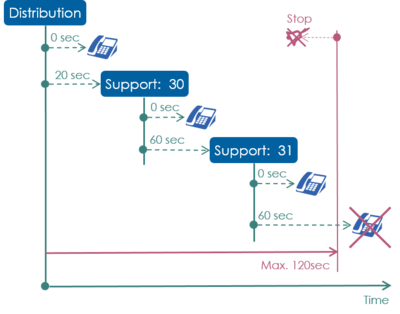Difference between revisions of "Admincenter subsc distributions"
| Line 3: | Line 3: | ||
{{Page_Menu_List_Help_AdminCenter_Feature}} | {{Page_Menu_List_Help_AdminCenter_Feature}} | ||
<!-- FOOTER LEFT "© Aarenet AG 2017" --> <!-- PDF Creation Directive ------------------------------> | <!-- FOOTER LEFT "© Aarenet AG 2017" --> <!-- PDF Creation Directive ------------------------------> | ||
| − | |||
| Line 29: | Line 28: | ||
<!-- PAGE BREAK --> <!-- PDF Creation Directive ---------------------------------------------------> | <!-- PAGE BREAK --> <!-- PDF Creation Directive ---------------------------------------------------> | ||
| + | <!-- Transclusion : Article Begin -----------------------------------------------------------------><section begin=article /> | ||
{{PAGE_DIVERSION_FEATURE}} | {{PAGE_DIVERSION_FEATURE}} | ||
{{ToTop}} <!---------------------------------------------------------------------------------------> | {{ToTop}} <!---------------------------------------------------------------------------------------> | ||
Latest revision as of 15:30, 5 September 2017
| Note | The features and/or parameters listed in this article may not be available from your telephone service provider. |
|
|
|
|
|
De Fr En |
Introduction
Call distributions are used to allow incoming calls to be forwarded to telephones or other destinations. The flexible configuration options allow to implement group calls, ring calls, etc.. Different call routing schemes can be configured for different day times and/or weekdays.
As destinations can be configured:
- National or intentional telephone numbers
- vPBX internal telephone numbers
- VoiceMail Box
- Announcements with or without interactive user guidance IVR
The call distribution can be controlled in time:
- Time delayed
- Only at certain times of the day
- Only on certain weekdays
Contents
- 1 The Call Distribution
- 2 Examples of Call Distributions
- 3 Configuration
- 3.1 Where to Configure this Feature
- 3.2 Creating, Modifying and Deleting a Distribution Element
- 3.3 Configuration of a Distribution Element
- 3.4 Parameter Configuration
The Call Distribution
Characteristics of a Call Distribution
The "call distribution" is used to route incoming calls to other telephones and other destinations. The flexible configuration options allow group calls, cyclic calls, etc. to be implemented. Different call distribution schemes can be configured for different times and/or weekdays.
| Note |
The basic goal of a call distribution is to ensure that no call remains unanswered. |
A call distribution is tied to a telephone number, e.g. to the internal vPBX number 30 which is assigned to the support organization. An internal subscriber of this vPBX can directly call this internal telephone numbers. An external caller can call the public support number 030 300 030. In this case, the dial-in DDI will foreward the external caller to the internal support number.
Also, residential user with only one telephone number can use the call distribution for forwarding incoming calls to e.g. their mobile, to the office, VoiceMail Box etc.
A call distribution contains any number of call distribution elements. Each call distribution element contains a forwarding destination and all the necessary information what shall happen when this destination is called.
The following overview explains the possibilities of a call distribution element:
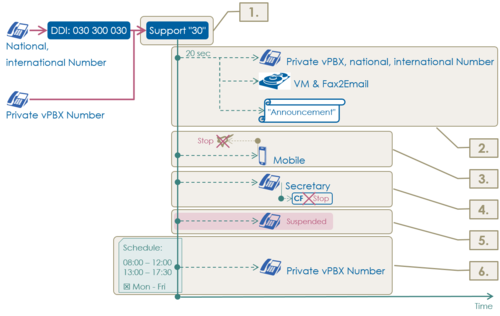
1. Telephone Number and Name
- The call distribution is assigned to the telephone number of the user account or to any internal vPBX telephone number.
- The name of the call distribution itself is the name of the account.
- Any call distribution element can have any Name
- Note:
- There is no need for a VoIP device to register to the call distribution number.
- Since a call distribution has a real own telephone number, it can be the forward destination of an other call distribution.
- Note:
2. Forward Destination and Delay
- Each call distribution element has a forward destination. The following destinations are available:
- National, international or internal vPBX telephone number
- VoiceMail Box
- Announcement with or without interactive user guidance IVR
- It can be determined with which delay the destination shall be called.
3. Stop Ringing
- With each call distribution element it can be determined what shall happen with the ringing of the previous called destinations of this or an other involved call distribution:
- * All previous called destinations continue with ringing
- * All previous called destinations must stop their ringing
4. No Further Forwarding
- With each call distribution element, it is possible to determine whether configured forwarding at the destination, e.g. a "Distributions" or "Forewards" , shall be executed or not.
- Example:
- The "private" forwardings of the reception desk (secretary) must not be executed when an incoming call is distributed for support issues.
5. Suspend call distribution element
- Each call distribution element has its "Status", which determines whether it should be executed or suspended. So call distributing elements can be prepared but not activated.
- Example:
- Only the distribution elements of the responsible emergency personnel are activated the others are suspended.
6. Schedule
- For each call distribution element it can be scheduled when it is activated:
- * During the day: From - To
- * On which weekdays: Mon - Sun
Suspend from Call Distributions
If a subscriber is included in one or more call distributions, it can be suspended from a specific or all call distributions. The suspension must be manually released!
Via AdminCenter the user can suspended himself from a call distribution by setting "State" to "suspend". Or the user can suspend himself using the *#-stimulus-procedure "Service 49":
| Service 49 Turn on or off call distribution: | *#-Code: | Remark: |
| Temporarily turn off this number in the call distribution: | *49(*)<NUMBER_DIST> | <NUMBER_DIST>: Telephone number of the dist. group |
| Turn on this number in the call distribution: | #49(*)<NUMBER_DIST> | |
| Temporarily turn off this number in all distribution groups: | *49 | |
| Turn on this number in all distribution groups: | #49 |
The provider may have defined another *#-code for this service. Check at your provider for the valid *#-code!
Example:
- A supporter cannot serve any calls, and therefore wants to suspend himself from the call distribution of telephone number "30" temporarily.
- The supporter dials on his telephone:
- *4930
The vPBX Call Distribution Scheme "Normal/Night/Weekend"
With the feature vPBX Distribution Scheme "Normal/Night/Weekend" all distributions of a vPBX can be forced to their behavior as at 24:00 of the given day ("Night") or 24:00 of the next Sunday ("Weekend").
This can be useful if for example all employees leave their offices at ten o'clock. The secretary switches the vPBX to "Night" call distribution. Or there are two holidays (Thursday and Friday), so the secretary switches the vPBX to "Weekend" call distribution.
"Normal" :
- The vPBX uses the distributions of the given day time.
"Night" :
- The vPBX forwards incoming calls according the distributions which will be active at 24:00 of the given day. The "Night" distribution is switched off automatically at 00:00 of the next day (resp. the distributions at 00:00 become active).
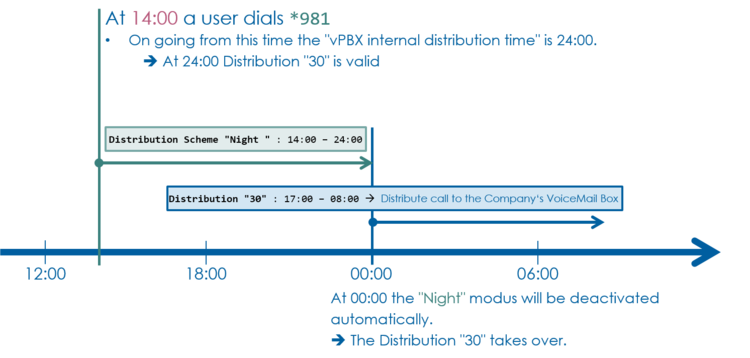
- The vPBX forwards incoming calls according the distributions which will be active at 24:00 of the next Sunday. The "Weekend" distribution is switched off automatically at 00:00 of the next Monday (resp. the distributions at 00:00 of the next Monday become active).
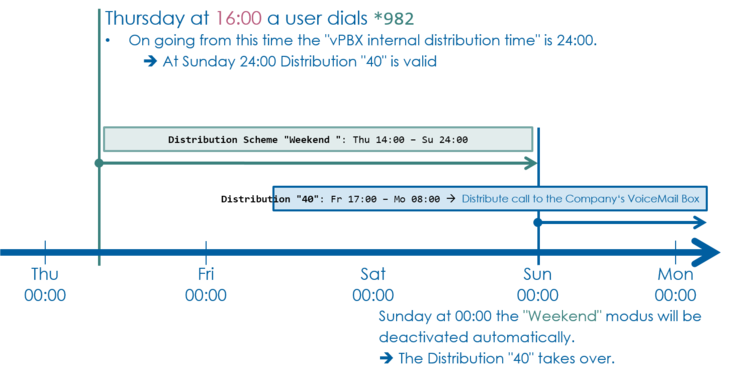
In the AdminCenter the vPBX Administrator can change the call distributions scheme by modifying "Distribution Scheme "Normal/Night/Weekend" .
Any internal user of a vPBX can change the distribution scheme "Normal/Night/Weekend" with the *#-stimulus-procedure "Service 980":
| Service 980 Call distribution normal/night/weekend: | *#-Code: | Remark: |
| Activate the "Normal" call distribution: | *980 | Activated weekend call distributions are deactivated prematurely. |
| Activate the "Night" call distribution: | *981 | |
| Activate the "Weekend" call distribution: | *982 |
The provider may have defined another *#-code for this service. Check at your provider for the valid *#-code!
Examples of Call Distributions
| Best Practice |
Do:
|
Distribution for a Private Telephone Number
Aim of this distribution:
- During the working days forward to the office telephone:
- Mon – Fri 08:00 – 17:30
- 14 sec delayed
- Always forward to the mobile phone:
- 20 sec delayed
- Always forward to the VoiceMail Box:
- 30 sec delayed
- All previous destinations stop ringing
Scheme:
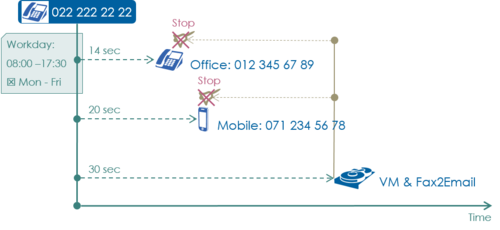
Configuration in the AdminCenter:

Distribution for a Support Group
Aim of this distribution:
- During the working days forward to the supporter numbers 31 and 32:
- Mon – Fri 08:00 – 12:00, 13:00 - 17:30
- 0 sec delayed
- During the working days forward to the supporter number 33:
- Mon – Fri 08:00 – 12:00, 13:00 - 17:30
- 14 sec delayed
- During the working days forward to the secretary number 11:
- Mon – Fri 08:00 – 12:00, 13:00 - 17:30
- 25 sec delayed
- During all other tines always forward to the VoiceMail Box of 40:
- 45 sec delayed
- All previous destinations stop ringing
- Hint:
- The distribution behavior is used that when no other call element is active, e.g. in the night or weekend, the delay of 45 sec is automatically shortened to 0 sec.
Scheme:
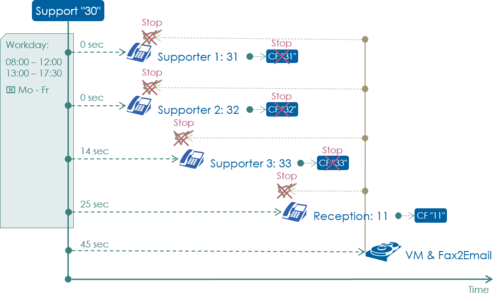
Configuration in the AdminCenter:

Distribution for a Cyclical Group Call
Aim of this distribution:
- The telephone of number 31, 32, 33, 34 shall be invoked cyclically:
- 10 sec delay between the invocations
- All previous destinations stop ringing
Scheme:
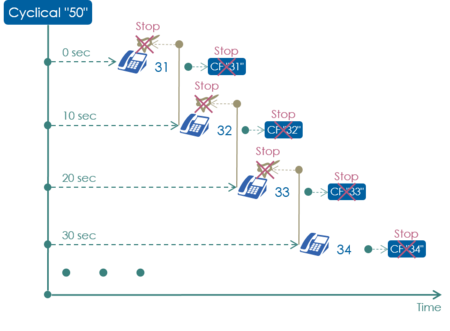
Configuration in the AdminCenter:

Configuration
Where to Configure this Feature
As vPBX administrator:
-
 Tab "PBX"
Tab "PBX"
-
 Tab "Subscriber xx"
Tab "Subscriber xx"
-
-
 Tab "Distribution"
Tab "Distribution"
-
As subscriber:
-
 Tab "Distribution"
Tab "Distribution"
Creating, Modifying and Deleting a Distribution Element
Create a new distribution element:
- Click Button [ + Add ]
- A dialog pops up where the following parameters can be configured:
- Define a function describing "Name" .
- Define the "Destination"
- Define the "Delay" until the destination is called .
- Define if the "Other Phones" shall continue with ringing.
- Define if following "Call Forward" shall be executed
- Define with "State" if the distribution element is active at all.
- Define at which "Day Time" the distribution element is active.
- Define at which "Week Days" the distribution element is active.
- For saving the configurations click the Button [ Save ]
Modify an existing distribution element:
- Click the row of the desired distribution element
- Modify the desired parameter
- For saving the configurations click the Button [ Save ]
Delete a distribution element:
- Click the waste icon
 at the end of the row of the desired distribution element
at the end of the row of the desired distribution element
Configuration of a Distribution Element
Define a Name
The call distribution element can have any Name. It serves to describe the task of the call distribution element.
Define the Destination
As possible destinations of a call distribution element can be selected:
- "Number":
- The call will be routed to the configured destination number.
- The destination number can be any telephone number, e.g. public telephone numbers, internal vPBX telephone number. If the distribution has an vPBX internal number then don't forget to add prefix , e.g. "0").
- "VoiceMail":
- The call will be routed to the VoiceMail Box of this number. The feature VoiceMail Box must be activated so that it can be selected.
- "Announcement":
- The call will be routed to the selected announcement. You can select the announcements made for this telephone number.
Delayed Forwarding to the Destination
The call forwarding to the destination can be delayed:
- The delay specifies how many seconds the routing shall be delayed.
- The time measurement starts when this call distribution was invoked.
Example for calculating the delay:
- As a rule of thumb, a telephone rings once every 4 seconds. When the routing shall be started after four times of ringing, the delay is calculated as follows:
- 4 rings x 4 sec + 2 sec reserve = 18 sec delay
| Note |
If the destination is a telephone number and no VoIP device is registered to the number, the delay is not carried out unless the destination has its own call distribution! |
Limiting by the System-Wide Ring Back Time
The telephone switch and vPBX has a system-wide maximum ring-back time, which determines how long telephones may ring on an incoming call. This max. ring-back time prevents telephones from "ringing infinitely". By default, the max. ring-back time is set to 120 seconds.
The max. ring-back time restricts the accumulated delay time since the incoming call to the last possible destination:
| Note |
Consult the vPBX administrator or provider for information of the max. ring-back time. |
The restriction by the max. ring-back time can be bypassed by creating a call distribution on an announcement. The announcement should contain a "Restart" whose duration is less than the max. ring-back time.
Already Ringing Telephones Stop or Continue Ringing
Define if other already ringing telephones of this or previously invoked distributions shall continue with ringing:
- Stop all already ringing telephones
- All ringing telephones continue with ringing
Stop Forwarding of the New Destination
The parameter "Call Forward" defines if call forwards and call distributions of the new destination shall be executed or not:
- "possible"
- Forwarding, if any, of the new destination are executed.
- "not possible"
- Forwarding of the new destination are not executed.
Example:
- The supporter "31" has the internal vPBX number 31 and is also a member of the call distribution "Support". The supporter has also a direct dialing in telephone number and configured "private" call forwards on the internal telephone number 31.
- Now, if a call arrives at the support group, then it is not desired that the "private" call forwards of supporter "31" are executed for the supporter group routing.
- → The solution is that in the call distribution element to supporter "31" the "Call Forward" is configured to "not possible".
Disable the Distribution Element
The call distribution element can be disabled by parameter "State":
- * "suspended"
- The call distribution element will not be executed.
- * "active"
- The call distribution element is executed.
Schedule for Distribution Elements
It is possible to define at which times and/or weekdays a distribution element should be executed. This determines when a destination number is to be reached.
Schedule for Day Times
With the configuration of day times it will be defined at which times the call distribution element is active:
- "From" - "To"
- If no times are configured then the call distribution element is active all day.
- If day times and weekdays are configured, then this call distribution element is only active on these days at the defined times of the day.
Examples:
- Forwarding "Night" to the VoiceMail Box from 18:00 - 08:00:
- From To
- 00:00 08:00
- 18:00 24:00
- Forwarding to call distribution "Support" from 08:00 - 12:00, 13:30 - 18:00:
- From To
- 08:00 12:00
- 13:30 18:00
- Forwarding to call distribution "Children's Crib":
- 08:00 - 09:30, children rest, 11:00 - 12:30, lunch break, 14:30 - 18:00
- → If more than two time schedules are required, then two ore more call distributing elements to the same destination must be defined!
- Distribution Element, Name: "Children's Crib Morning"
- From To
- 08:00 09:30
- 11:00 12:30
- Distribution Element, Name: "Children's Crib Afternoon"
- From To
- 14:30 18:00
Schedule for Weekdays
With the configuration of weekday it will be defined at which days of the week the call distribution element is active:
- Selection of the desired weekday: Mon, Tue, Wed, Thu, Fri, Sat, Sun
-
- If no weekday is selected, then this element is active every day.
- If day times and weekdays are configured, then this call distribution element is only active on these days at the defined times of the day.
Parameter Configuration
Parameter: Name
| Description: | Defines the name of the distribution |
| Configuration: | Configuration String:
|
| Default: | None |
| Version: | AdminCenter V6.0 |
Parameter: Destination
| Description: | Defines the call destination type of this distribution element and further needed informatin to the destination, e.g. telephone number. |
| Configuration: | Selection Menu:
|
| Default: | Nummer |
| Version: | AdminCenter V5.7 |
Parameter: Delay
| Description: | Defines the time delay in seconds until the destination is called.
|
| Configuration: | Number |
| Default: | 14 |
| Version: | AdminCenter V5.7 |
Parameter: Other Phones
| Description: | Defines of already ringing telephones of this or preceding distributions shall continue or stop with ringing. |
| Configuration: | Selection Menu:
|
| Default: | stops ringing |
| Version: | AdminCenter V5.7 |
Parameter: Call Forward
| Description: | Defines if following distributions or call forwarding shall be executed or not. |
| Configuration: | Selection Menu:
|
| Default: | möglich |
| Version: | AdminCenter V5.7 |
Parameter: State
| Description: | Defines if this distribution element is executed.
Hint: |
| Configuration: | Selection Menu:
|
| Default: | active |
| Version: | AdminCenter V5.7 |
Parameter: Schedule, Day Time: "From" – "To"
| Description: | Defines at which day times the distribution element is activated.
| ||
| Configuration: | Configure the times in the hh:mm format | ||
| Default: | NO day times | ||
| Version: | AdminCenter V5.7 |
Parameter: Schedule, Week Days: "Mon", "Tue", "Wed", "Thu", "Fri", "Sat", "Sun"
| Description: | Defines at which days of a week the distribution element is activated.
| ||
| Configuration: | Selection Button:
| ||
| Default: | No week days selected | ||
| Version: | AdminCenter V5.7 |
© Aarenet Inc 2018
Version: 3.0
Author: Aarenet
Date: July 2017
